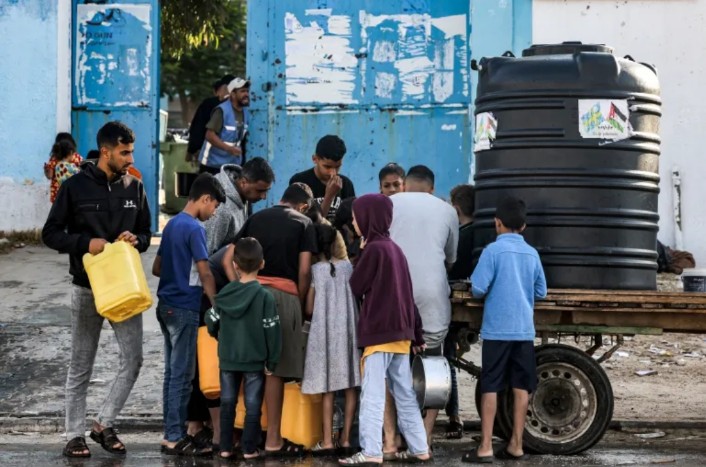People in Gaza are relying on salty tap water
After Israel issued an evacuation order for 1.1 million Palestinians in the northern part of Gaza, Mushtaha drove his wife and children aged eight to 15 to his aunt’s home in Khan Younis, where residents opened their doors to extended family and friends amid Israel’s relentless aerial bombardment.
The UN says that currently in Gaza only three litres of water a day is available per person to cover all their needs including drinking, washing, cooking and flushing the toilet. Between 50-100 litres of water each day is the recommended amount for a person to meet their basic health requirements, according to the World Health Organization (WHO).
As a water and sanitation officer for global non-profit Oxfam, Mushtaha sees the markers of an impending public health catastrophe all around him. “People sleep on the streets, in shops, in mosques, in their cars or on the streets,” he said. His family lives alongside around 100 people crammed in a 200-square-metre apartment and count themselves among the lucky ones.
Hygiene products have disappeared from the few supermarkets that are open and water sold by private vendors who run small solar-powered desalination facilities has doubled in price since October 7 – when Israel began bombing Gaza in retaliation for the surprise attack carried out by Hamas. It used to cost 30 shekels ($7.40), but is now priced at 60 shekels ($15).
Oxfam and United Nations agencies have warned that the collapse of water and sanitation services will spark bouts of cholera and other deadly infectious diseases if urgent humanitarian aid is not delivered.
Israel cut off its water pipeline to Gaza, along with the fuel and electricity provisions that power water and sewage plants, after announcing a total blockade of the Palestinian enclave following the Hamas attack.
Most of Gaza’s 65 sewage pumping stations and all five of its wastewater treatment facilities have been forced to stop operations. According to Oxfam, untreated sewage is now being released into the sea while solid waste is also ending up on some streets alongside bodies waiting to be buried.
Desalination plants have stopped working and municipalities are unable to pump water to residential areas because of the power shortage. Some people in Gaza are relying on salty tap water from the enclave’s only aquifer, which is contaminated with sewage and seawater, or have resorted to drinking seawater. Others are being forced to drink from farm wells.




The Brief. Sign up to receive the top stories you need to know right now.